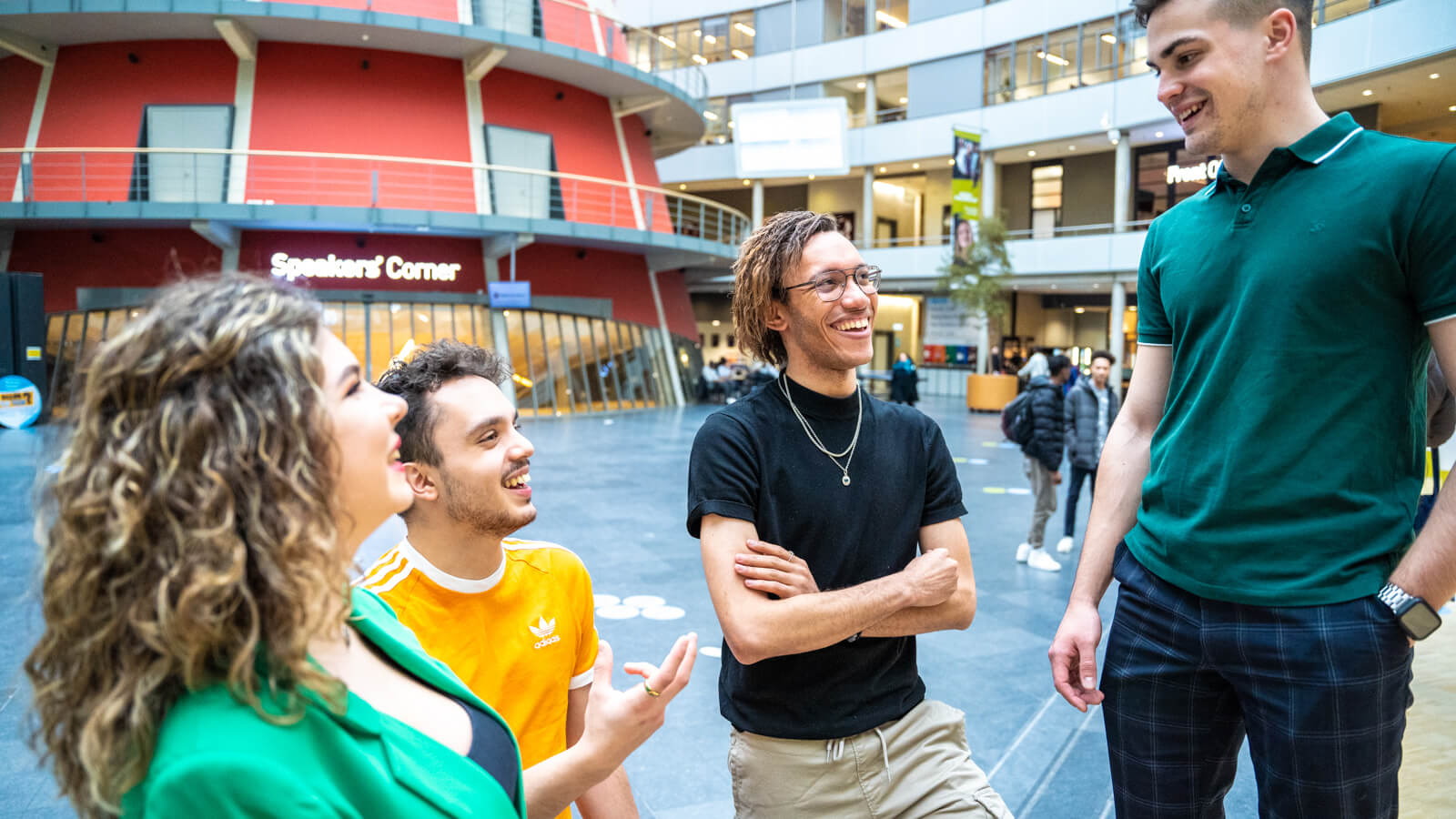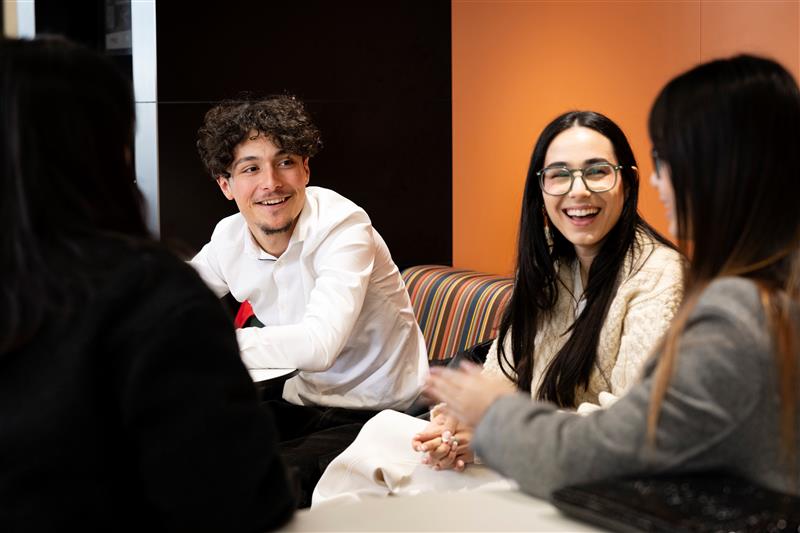For you?
Would you like to become a professional in International Communication Management in just three years? If you are ambitious and keen to study in an international classroom, this programme may be exactly what you are looking for. Over the course of three years, you follow project-based higher professional education that prepares you for an exciting career in international communications.
Can you see yourself developing an international media campaign? Or organising a global conference and managing all related communications and marketing? During this English-taught, three-year degree programme, you learn how to build and maintain a positive organisational image, how to influence the behaviour of target groups and how effective communication can help protect a reputation in times of crisis. You apply what you have learnt quickly by working with international organisations, ranging from multinationals to globally operating NGOs. For example, in Year 2 you complete an international minor. This helps you grow rapidly into a communications professional who is ready to take on complex challenges.
Studying in The Hague gives you an additional advantage. The city is known internationally for peace and justice, and hosts many multinationals and NGOs. You graduate with a portfolio of professional products that shows employers exactly how you can make a difference in international communication management. Your career prospects are strong.
Would you like to continue studying after completing this programme? Many students choose to progress to a higher professional education or university master’s degree. Take the time to explore which ambitious, fast-paced programme suits your goals.
Admission requirements
You have a Dutch diploma
To start the three-year ICM bachelor's degree programme, you should have a VWO diploma with the appropriate profile.
Below, you can find the entrance requirements for this programme when you have a Dutch diploma.
ICM is a three-year bachelor of arts programme. Unlike most THUAS programmes, which last for four years, the international three-year programme is more intensive. A propaedeutic certificate ('propedeuse') acquired at a (Dutch) university of applied sciences will not make you eligible for admission to this programme, unless you possess a VWO (or equivalent) diploma.
| Preliminary education | Required profile |
|---|---|
| Havo (senior general secondary education) | Does not qualify for admission |
| Vwo (pre-university education) |
|
| Mbo (senior secondary vocational education and training) | Does not qualify for admission |
You have a non-Dutch diploma
To enrol for the ICM 3 year programme you will need a secondary school diploma comparable to a Dutch VWO diploma and a good command of English.
Before we can decide on your eligibility, we’ll need to assess your secondary school certificate.
To make sure your certificate is evaluated fairly, we work with NUFFIC, an organisation that specialises in the assessment of international education qualifications.
Language requirements
If you were not educated in the Netherlands you usually have to submit a language test to be admitted. Depending on the type and country of your diploma you may however qualify for exemption. Please check our entry requirements page for more information.
English proficiency
Since the programme is fully taught in English, your English speaking and writing skills must be at a good level. Below we indicate when an additional English language test is not required and when it is.
No additional test required:
- If you have obtained a Dutch VWO diploma;
- If you have successfully completed secondary education in the United Kingdom, Ireland, the United States, Australia, New Zealand, South Africa, Malta, or Canada (provided English was the main language of instruction);
- If your diploma appears on this list and English was one of your examination subjects;
- If you hold a European or International Baccalaureate diploma.
Additional test required:
- If your diploma does not meet the requirements listed above.
Need help with your English?
Do you need help improving your English? You can enroll in the English Academic Preparation Programme. After successfully completing this programme, you will not only be prepared for a bachelor’s or master’s degree, but you will also have learned much more about The Netherlands, The Hague, and our university of applied sciences.
Please check the admission requirements for more information. If you have any questions, please contact Enrolment Centre.
Don’t meet the entry requirements?
Perhaps your academic background is not quite the right level. Or you need some help improving your English skills. Don’t worry. There might be some alternative options to help you get in, and prepare yourself for a successful start of your studies at The Hague University of Applied Sciences (THUAS).
21+ admissions test
If you’re 21 years old before 1 September 2022, but don’t have a diploma or a qualification that meets the entry requirements, you can take the 21+ Admissions Test. The 21+ Admissions Test is offered at several dates between January and the start of the academic year, and consists of a digital general capacity test. Please note that you can only participate if you have an EEA-nationality or residence permit for the Netherlands that is valid on the test date.
English Academic Preparation Programme
Need help with your English? If you haven’t quite reached the right level of English for your chosen Bachelor’s or Master’s degree programme, you can enrol for English Academic Preparation Programme. After the successful completion of this programme, you’ll be ready to start your degree at THUAS and you will already have a good taste of studying and living in the Hague.
The Hague Pathway College
If you’d like to apply for a 3-year bachelor programme but don’t meet the academic entry requirements, you might be interested in joining The Hague Pathway College. This foundation programme has two intakes, one in September and one in January. It offers you the chance to bring your academic level up to the required level and work on your English at an academic level at the same time.Please check www.thehaguepathway.nl for more information.
Decisions regarding your qualification for admission
There are no exceptions to the official admission requirements. The Enrolment Office is the only party that can make decisions regarding your qualification for admission based on official regulations. You can’t rely on any other sources of information for your qualification for admission.
Degree programme content
What will you study each year?
Degree programme in figures
Discover THUAS
Your guide to our upcoming study-choice events
Career perspective
What can you become
Communications Consultant
Online Communications Manager
Public Relations Officer
Marketing Communications Coordinator
Project Manager
Event Coordinator
Social Media Manager
Content Creations Manager
Continue studying
Many ICM graduates choose to continue their studies with a master’s degree. The programme has low dropout rates and excellent career prospects, and around half of our graduates progress to a master’s programme. At The Hague University of Applied Sciences, you can continue your studies through the publicly funded master’s programme Sustainability Transitions and the non-funded master’s degree programme International Communication Management. You may also choose to pursue a master’s degree at another university of applied sciences, at a research university in the Netherlands or at an international university abroad.
Testimonials from our alumni
Testimonials from our alumni What lies in store after studying International Communication Management? Our former students tell us where they ended up and how they look back on their study years.
Testimonials from our lecturers
Practical information
How to apply
Your enrolment request must be submitted through Studielink. Before you do, please check the official name of the programme below. Would you like to find out more about the application process first? Check our page How to apply . The key deadlines are listed here as well. This degree programme starts in September and there is no intake in February.
Tuition fee
You will have to pay tuition fees when you enrol on a bachelor's programme. You can pay in one or more instalments. If you pay in more than one instalment a small administration fee is charged.
More information about tuition fees
Scholarships
Find out more about scholarships for international students. Please note that these scholarships are one-off scholarships only, meaning that if you obtain them it is only for your first year of study.
Student finance
Dutch students qualify for extra financial support via a loan. Dutch students automatically qualify for this financial assistance and international students may be eligible if they have lived in the Netherlands for at least five years or are employed for at least 56 hours per month.
Additional Costs
You must also budget for books, excursions and field trips. You can expect to pay approximately €800 per year to cover these additional costs. During your semester abroad, you will also need to pay for tickets, housing and insurance.
Visa and residence permit
Help in choosing your study
We would like to help you make the right decision
It takes a bit of thought and research to find the right programme. The Hague University of Applied Sciences organizes various activities throughout the year to give you the best possible idea of the various studies offered. You also learn what it’s like to study at THUAS. This way, you can click on the registration button without a doubt in mind. Or you’ll know for certain it’s not right for you.
Walk in at our Study & Career Centre for…
Support during your studies
Throughout your studies you receive support from various staff members and services. At the start of the programme, you are assigned a study career counsellor, who is a lecturer from your degree programme and your first point of contact for questions about your studies, internships and future career. You also follow study career guidance classes. If you need tutoring, an older-year tutor can help you with your coursework and offer practical tips. If you would like to talk about personal or study-related concerns, such as doubt, illness or difficult circumstances, you can always reach out to our psychologist, confidential counsellor, student counsellor or the Career Centre. We are here to support you throughout your studies.
Official details of the programme
This degree programme is registered in Registration of Institutions and Programmes (RIO):
- Official Dutch name of degree programme: Communicatie
- Official international name: Communication
- Programme code (Isat): 34405
- Institution code (Brin): 27UM
Both the official Dutch and the official international name of the degree programme (current at the time of your graduation) will be printed on your diploma.
For more information on the accreditation of this degree programme, see the Accreditation Organisation of the Netherlands and Flanders (NVAO) website.
Looking for a different degree programme?
You might find these programmes interesting too!




